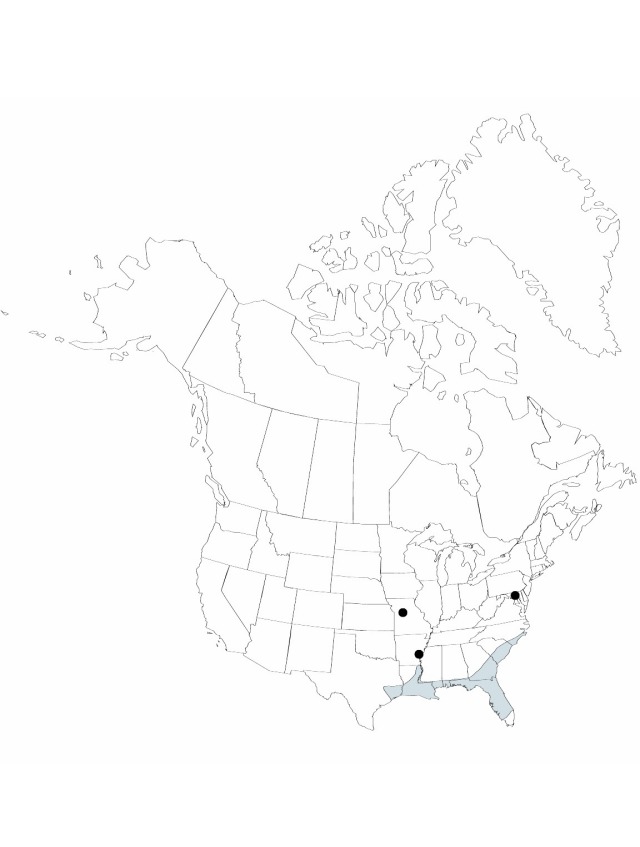Difference between revisions of "Commelina caroliniana"
Flora Caroliniana, secundum. 68. 1788.
FNA>Volume Importer |
imported>Volume Importer |
||
| (One intermediate revision by the same user not shown) | |||
| Line 6: | Line 6: | ||
|place=68. 1788 | |place=68. 1788 | ||
|year=1788 | |year=1788 | ||
| + | }} | ||
| + | |special_status={{Treatment/ID/Special_status | ||
| + | |code=I | ||
| + | |label=Introduced | ||
}} | }} | ||
|basionyms= | |basionyms= | ||
| Line 22: | Line 26: | ||
|habitat=Fields, roadsides, railroad rights-of-way, yards, waste places, especially in moist situations, weed in crops, especially rice, sugar cane and corn, and rarely in forests | |habitat=Fields, roadsides, railroad rights-of-way, yards, waste places, especially in moist situations, weed in crops, especially rice, sugar cane and corn, and rarely in forests | ||
|distribution=Ala.;Ark.;Fla.;Ga.;La.;Md.;Miss.;Mo.;N.C.;S.C.;Tex.;native;India. | |distribution=Ala.;Ark.;Fla.;Ga.;La.;Md.;Miss.;Mo.;N.C.;S.C.;Tex.;native;India. | ||
| + | |introduced=true | ||
|tables= | |tables= | ||
|references={{Treatment/Reference | |references={{Treatment/Reference | ||
| Line 46: | Line 51: | ||
|publication title=Flora Caroliniana, secundum. | |publication title=Flora Caroliniana, secundum. | ||
|publication year=1788 | |publication year=1788 | ||
| − | |special status= | + | |special status=Introduced |
| − | |source xml=https:// | + | |source xml=https://bitbucket.org/aafc-mbb/fna-data-curation/src/2e0870ddd59836b60bcf96646a41e87ea5a5943a/coarse_grained_fna_xml/V22/V22_176.xml |
|genus=Commelina | |genus=Commelina | ||
|species=Commelina caroliniana | |species=Commelina caroliniana | ||
Latest revision as of 20:29, 5 November 2020
Herbs, annual, diffusely spreading. Roots at nodes. Stems decumbent to scandent. Leaves: blade lanceolate to lanceolate-elliptic or lanceolate-oblong, 2.5–10.5 × 0.7–2.4 cm, margins scabrous, apex acute to acuminate, glabrous. Inflorescences: distal cyme vestigial, included (rarely 1-flowered and exserted); spathes solitary, bright green, paler basally, without contrasting veins, pedunculate, not at all to slightly falcate, 1.2–3(–3.7) × 0.5–1 cm, margins distinct, usually ciliate, apex acuminate, glabrous or very sparsely pilose; peduncles 0.6–2.3 cm. Flowers bisexual; petals all blue, proximal petal white medially, smaller; medial stamen with white connective; staminodes 3; antherodes yellow, often with central maroon spot, cruciform. Capsules 3-locular, 2-valved, (5–)6–8 mm. Seeds 5, dark brown, 2.4–4.3(–4.6) × (1.6–)2–2.3 mm, smooth to faintly alveolate, mealy. 2n = ca. 86.
Phenology: Flowering summer–fall (rarely winter).
Habitat: Fields, roadsides, railroad rights-of-way, yards, waste places, especially in moist situations, weed in crops, especially rice, sugar cane and corn, and rarely in forests
Distribution

Introduced; Ala., Ark., Fla., Ga., La., Md., Miss., Mo., N.C., S.C., Tex., native, India.